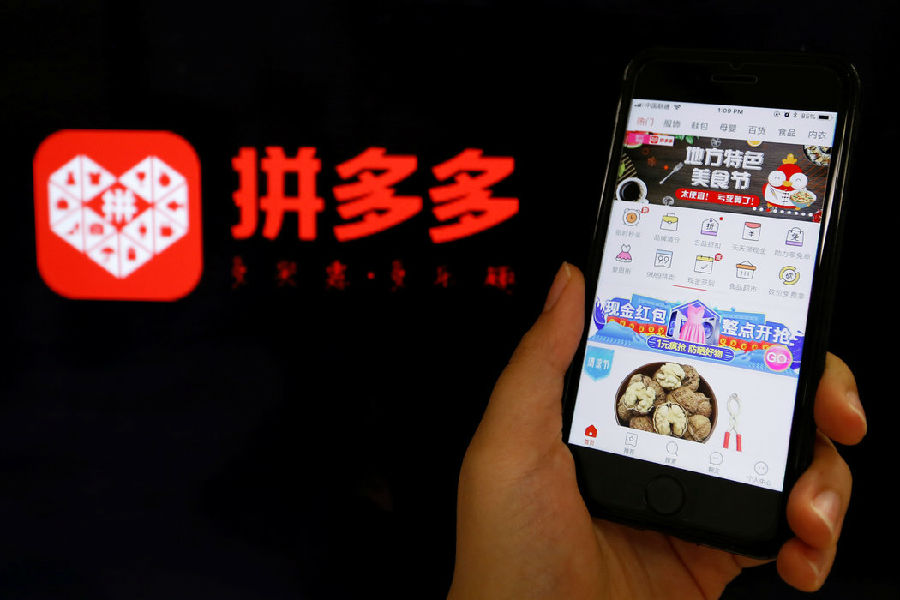BEIJING — China’s hottest new online bazaar has had a whirlwind year. The number of people shopping on the app, Pinduoduo, has grown more than fivefold since the beginning of 2017, and its parent company is preparing to list shares on the Nasdaq, one of a wave of Chinese tech companies tapping international capital markets this year.
北京——中国最热门的新购物软件经历了飞速发展的一年。使用拼多多这一软件购物的用户数量与2017年初相比,已经增长了五倍多。拼多多的母公司正准备推动其在纳斯达克上市,这也迎合了今年以来中国科技公司进军国际资本市场的浪潮。
But by taking its business global, Pinduoduo has exposed itself to a new kind of stumbling block: a trademark infringement lawsuit in the United States.
但是在推进其业务全球化的过程当中,拼多多面临一项新的阻碍:美国商标侵权诉讼。
The complaint, filed Thursday in a federal court in New York by a diaper maker called Daddy’s Choice, says that Pinduoduo knowingly allowed the sale of knockoff products bearing the Daddy’s Choice name. According to the suit, the e-commerce platform removed some of the unauthorized goods when Daddy’s Choice, which is based in Beijing, first reported them last year. But the items quickly reappeared, and Pinduoduo took no action when notified of them again this year, the complaint says.
上周四,一家名为“爸爸的选择”的尿布生产商向纽约一家联邦法院提出上诉,称拼多多在知情的情况下允许销售假冒其品牌的产品。根据诉讼,该电商平台在去年第一次接到总部位于北京“爸爸的选择”的投诉时,曾将部分未经授权的商品下架。但是这些商品很快又出现了,而且根据诉讼,当拼多多今年再次被通告此事时,它没有采取任何措施。
Lawyers for Daddy’s Choice say in the complaint that they filed the suit in New York because American consumers are able to buy from Pinduoduo, and because Daddy’s Choice has spent considerably to build its brand in the United States. Pinduoduo declined to comment.
“爸爸的选择”的律师们在诉讼中说,他们之所以在纽约提起上诉,是因为美国的消费者可以通过拼多多购买产品,而“爸爸的选择”为了在美国打造这一品牌进行了大量的投资。
China is the world’s largest market for online retail, and giant companies and start-ups alike are competing to modernize the shopping experience. There are platforms catering to shoppers of every taste and persuasion, whether they want high-end imported wares or the latest in fast fashion. Heavyweights such as Alibaba and JD.com are experimenting with technologies such as facial recognition and drones to get people to buy more, and more often.
中国是全球最大的在线零售市场,商业巨头和创业公司们都在竞相推进它们的购物体验现代化。无论人们是想要高端的进口商品,还是最新的快时尚品牌,购物平台都能迎合不同品味与类型的消费者。电商巨头阿里巴巴和京东正通过试验例如面部识别和无人机这样的科技,来促使人们更多且更频繁地购物。
Even by the standards of China’s buzzy tech scene, Pinduoduo’s rise (its name is pronounced “PING-daw-daw”) has been extraordinarily rapid.
即便以中国科技飞速发展的现状来衡量,拼多多的上升也显得格外迅速。
The three-year-old company says that nearly 350 million people shopped on its platform in the past year, which would most likely make it China’s No. 2 e-commerce provider by that metric, behind only Alibaba. With its deep discounts on groceries, clothes, gadgets and knickknacks, the company has won over a vast, underserved population of online shoppers in China: older, less internet-savvy people living in smaller cities and the countryside.
这家成立了三年的公司称去年有近3亿5千万用户在其平台购物,按那样的规模衡量,拼多多很有可能成为仅次于阿里巴巴的中国第二大电商。因其在生鲜食品、服装、电子设备及摆设上的大幅折扣,该公司赢得了中国一大批没得到充分重视的在线消费者:上了年纪、对互联网不够精通且居住在小城镇和乡村的人。
But Pinduoduo has been dogged by accusations that its platform hosts sales of counterfeits, illegal goods or products that simply do not match their descriptions online.
但拼多多却一直深陷于其平台销售造假,售卖违法或是与描述不相符产品的各项指控当中。

In its filings with the United States Securities and Exchange Commission, Pinduoduo has said that it immediately removes unauthorized products or misleading information found on its platform, and that it freezes the accounts of merchants who violate its policies. Still, the company said in its regulatory filings that in January, the Chinese authorities required it to strengthen supervision and respond more effectively to claims of copyright infringement.
在给美国证券交易委员会的报备文件中,拼多多称它会第一时间从其平台撤下未经授权的商品或是有误导性的信息,并将冻结违反条例的店主的账号。拼多多还在报备文件中称,今年一月,中国政府已经要求它加强监管,并对侵权投诉进行更有效的处理。
Such allegations are hardly new in the world of Chinese e-commerce.
这样的指控在中国电商界从来不是什么新鲜事。
Alibaba’s Taobao marketplace has long been accused of being a haven for fakes, and the company fought a lawsuit brought by Kering, the French luxury goods group, about the prevalence of unauthorized sales. (Kering eventually withdrew the suit and teamed up with Alibaba to fight copyright violators.)
阿里巴巴旗下的淘宝被长期指控为假货的天堂。它曾应诉过法国奢侈品巨头开云集团有关淘宝未经授权销售行为泛滥的诉讼。(开云集团最终撤诉并与阿里巴巴合作,共同打击侵犯版权的行为。)
In January, the Office of the United States Trade Representative classified Taobao as a “notorious market” for piracy and counterfeiting. Alibaba has said that the complaints against it are unfair, and that it has taken many measures to detect and remove fakes.
今年一月,美国贸易代表办公室因隐私和假冒商品问题将淘宝归为“恶名市场”。阿里巴巴称这一针对它的指控是不公平的,因其已经采取了诸多手段以发现并删除假货。













